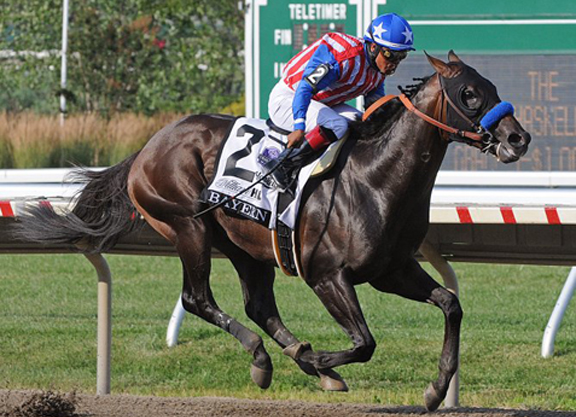By Lucas Marquardt
Hill 'n' Dale Farm's 2014 GI Breeders' Cup Classic winner Bayern (Offlee Wild) entered stud in 2016 and saw a warm reception at the weanling sales in 2017, cracking the top five among first-crop sires by average price. With a pedigree featuring a female line that traces back to the great Courtly Dee and a race record that displays both versatility and speed, Bayern could see his stock rise even further as the yearling sales season begins. In the latest in a multi-part series featuring first-crop yearling sires ahead of the Fasig-Tipton July Sale, the TDN's Lucas Marquardt sat down with John Sikura of Hill 'n' Dale to discuss the young stallion's prospects.
LM: Bayern was a throwback horse in a lot of ways as a 3-year-old. You don't see that many 3-year-olds start 10 times in a season and build in progression from a seven furlong graded race to the GI Breeders Cup Classic. Can you talk about his durability and versatility, and how that translates to him being an exciting stallion prospect?
JS: Bayern was a horse of exceptional talent–he was very fast. I thought his race in the [GII] Woody Stephens on Belmont Day was exceptional. He drew off and won by open lengths. He then competed against the older horses the same year. He won the Breeders Cup Classic. While there was some legitimate controversy about the race, if you look at his race record in total, he was obviously a horse of immense quality. He could win from 7/8ths to a mile and a quarter. For a 3-year-old to beat older horses winning the Classic, it's really a test of an exceptional horse.
LM: He hails from one of the great American families–you can trace him back to Courtly Dee. It's been a sire-producing family, it's been a family of great females. Talk about that family a little bit and then talk about the opportunities that presented to breeders.
JS: He's certainly well-bred enough to be a significant sire. He gets beautiful yearlings. He's really a well made horse. He sold for $320,000 as a 2-year-old. Donato Lanni bought him, Bob Baffert loved him, both as a 2-year-old and loved him as a racehorse. He legitimately thought he was a brilliant, brilliant horse. So, all the right people have endorsed the horse. His first foals sold extremely well and we expect his yearlings to be really well received and he's a horse we're really excited about.
LM: I thought it was interesting that his median was slightly above his average, and both were high for a stud fee–which to me indicates there was broad quality across his weanlings. Is that something you saw with his weanlings and now with his yearlings?
JS: Yeah, universally we saw quality–we saw them well received at auction. He'll have a lot more yearlings to sell than he did weanlings, so I would expect as solid as he was selling weanlings, he'll be as much or more solid when the yearlings are sent to auction. So, he's a horse that we were bullish about, we supported him with a lot of our own mares and clients supported him. We bred in excess of 100 mares every year, which is really great support for a new horse–and we're looking forward to next year when his 2-year-olds run.
LM: Is he a horse you expected to do very well at the 2-year-old sales next year?
JS: He was a brilliant 2-year-old himself. If he reproduces horses of his quality, of his aptitude, you'd expect that there would be 2-year-olds that train fast and go well who are are really well received at auction. We expect that he'll have several offspring that will fit that mold.
LM: He's a horse that you could say he was an incredible sprinter that could stretch his speed or a true Classic kind of horse that was just incredibly fast. Is he throwing one particular type that you're seeing? Does he kind of get a run of the gambit in terms of the types that he's getting, sprinter/miler types and Classic types, or is he throwing one particular type do you think?
JS: The Bayern foals–and now yearlings–are very athletic, they're very balanced, they really fit the picture from head to toe, they look like they are athletes. That's probably one quality that is consistent–they have good size, they have good scope, they move well, loads of quality. Whether they will be early 2-year-olds or whether they'll be Classic type horses, time will tell. Certainly in his race record and his ability show that he was an equal performer either going short, going long, one turn, two turn. So I would expect he'd give versatility in his offspring as he was such a versatile, high-end race horse himself.
LM: From your recent experience with Violence and Maclean's Music, can you talk about what it takes to make a young sire and how that relates to Bayern and how heavily you supported him?
JS: One of the commonalities of every horse that we stand at stud is that we support them with our own mares. We want to give them the best chance to succeed. We believe that our program of raising horses is exemplified by Grade I winners and outstanding racehorses have been raised here at the farm. We hand select mares, we buy mares that we think suit and fit a particular stallion. We probably bred approximately 20 mares to the horse every year of our own. We've had great support, with world class horses–SF Bloodstock has bred very nice mares to the horse. So I think we have a good team, a good partnership, a good group of people that are supporting the horse.
Not a subscriber? Click here to sign up for the daily PDF or alerts.






